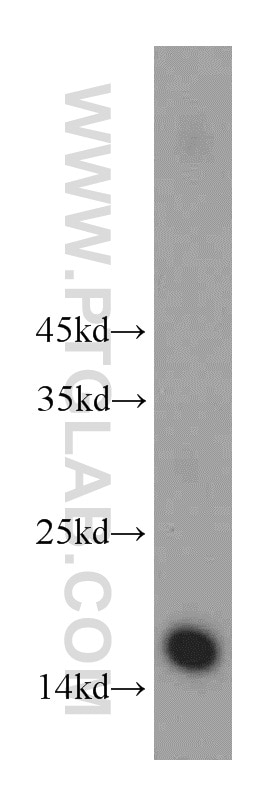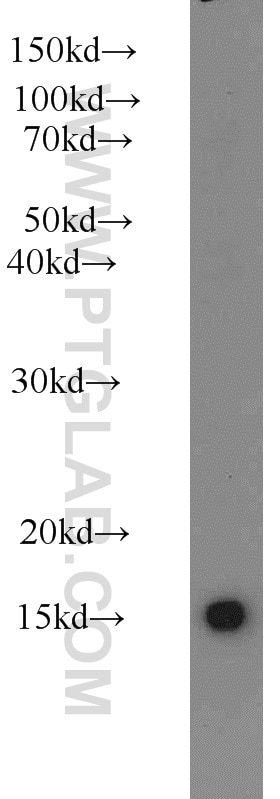- Featured Product
- KD/KO Validated
Histone H2A type 3 Polyklonaler Antikörper
Histone H2A type 3 Polyklonal Antikörper für WB, ELISA
Wirt / Isotyp
Kaninchen / IgG
Getestete Reaktivität
human, Maus, Ratte
Anwendung
WB, IP, IF, IHC, ELISA
Konjugation
Unkonjugiert
Kat-Nr. : 10445-1-AP
Synonyme
Geprüfte Anwendungen
| Erfolgreiche Detektion in WB | humanes Hirngewebe, fetales humanes Hirngewebe |
Empfohlene Verdünnung
| Anwendung | Verdünnung |
|---|---|
| Western Blot (WB) | WB : 1:500-1:1000 |
| It is recommended that this reagent should be titrated in each testing system to obtain optimal results. | |
| Sample-dependent, check data in validation data gallery | |
Veröffentlichte Anwendungen
| KD/KO | See 1 publications below |
| WB | See 3 publications below |
| IHC | See 1 publications below |
| IF | See 1 publications below |
| IP | See 1 publications below |
Produktinformation
10445-1-AP bindet in WB, IP, IF, IHC, ELISA Histone H2A type 3 und zeigt Reaktivität mit human, Maus, Ratten
| Getestete Reaktivität | human, Maus, Ratte |
| In Publikationen genannte Reaktivität | human, Maus |
| Wirt / Isotyp | Kaninchen / IgG |
| Klonalität | Polyklonal |
| Typ | Antikörper |
| Immunogen | Histone H2A type 3 fusion protein Ag0374 |
| Vollständiger Name | histone cluster 3, H2a |
| Berechnetes Molekulargewicht | 14 kDa |
| Beobachtetes Molekulargewicht | 14-18 kDa |
| GenBank-Zugangsnummer | BC001193 |
| Gene symbol | Histone H2A type 3 |
| Gene ID (NCBI) | 92815 |
| Konjugation | Unkonjugiert |
| Form | Liquid |
| Reinigungsmethode | Antigen-Affinitätsreinigung |
| Lagerungspuffer | PBS with 0.02% sodium azide and 50% glycerol |
| Lagerungsbedingungen | Bei -20°C lagern. Nach dem Versand ein Jahr lang stabil Aliquotieren ist bei -20oC Lagerung nicht notwendig. 20ul Größen enthalten 0,1% BSA. |
Hintergrundinformationen
Histone H2A type 3, it is expected to be located in the nucleus, and the protein is enriched in the brain tissue. Histones are basic nuclear proteins that are responsible for the nucleosome structure of the chromosomal fiber in eukaryotes. Nucleosomes consist of approximately 146 bp of DNA wrapped around a histone octamer composed of pairs of each of the four core histones (H2A, H2B, H3, and H4). The chromatin fiber is further compacted through the interaction of a linker histone, H1, with the DNA between the nucleosomes to form higher order chromatin structures. This gene is intronless and encodes a replication-dependent histone that is a member of the histone H2A family. The molecular weight of Histone H2A type 3 is 14 kDa.
Protokolle
| PRODUKTSPEZIFISCHE PROTOKOLLE | |
|---|---|
| WB protocol for Histone H2A type 3 antibody 10445-1-AP | Protokoll herunterladen |
| STANDARD-PROTOKOLLE | |
|---|---|
| Klicken Sie hier, um unsere Standardprotokolle anzuzeigen |
Publikationen
| Species | Application | Title |
|---|---|---|
Nucleic Acids Res H2A.Z.1 crosstalk with H3K56-acetylation controls gliogenesis through the transcription of folate receptor.
| ||
Nucleic Acids Res Brain-specific deletion of histone variant H2A.z results in cortical neurogenesis defects and neurodevelopmental disorder. | ||
EMBO Rep MacroH2A1.2 deficiency leads to neural stem cell differentiation defects and autism-like behaviors. | ||
BMC Cancer HIST3H2A promotes the progression of prostate cancer through inhibiting cell necroptosis |




